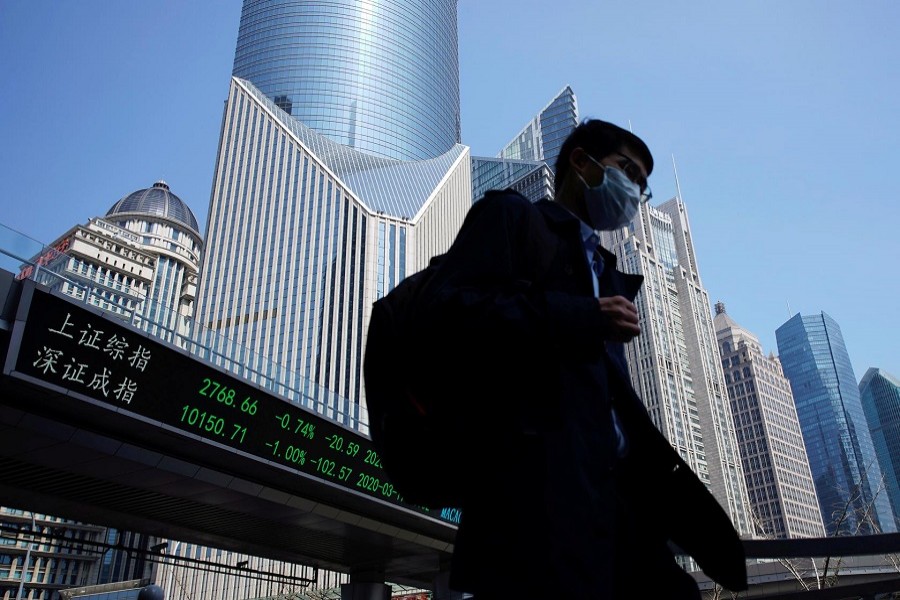Asian stocks clung to gains on Wednesday, helped by a bounce in Australian shares, but risks for equities remain large as the coronavirus pandemic rattles the underpinnings of the global economy.
E-Mini futures for the S&P 500 traded 1.39 per cent lower in Asian trade, highlighting the cautious mood.
MSCI’s broadest index of Asia-Pacific shares outside Japan rose 0.23 per cent. Australian shares jumped by 2.87 per cent, reversing a 2.0 per cent decline on Tuesday, as a slowdown in new coronavirus cases and rising iron ore prices lifted the market.
Shares in China, where the coronavirus first emerged late last year, rose 0.18 per cent, supported by hopes the world’s second-largest economy has started to recover.
China’s factory activity improved in March after plunging a month earlier, a private survey showed on Wednesday, just scraping into positive territory and beating analysts’ expectations.
Shares in South Korea, also hit hard by the virus, rose 0.19 per cent, but Japanese shares fell 1.05 per cent as a rapid increase in coronavirus infections in Tokyo fuelled speculation the government will place the capital on lockdown.
Wall Street tumbled on Tuesday, with the Dow registering its biggest quarterly fall since 1987 and the S&P 500 its steepest quarterly drop since a decade ago on growing evidence of the massive downturn the pandemic will incur.
US economic activity is likely to be “very bad” and the unemployment rate could rise above 10 per cent because of efforts to slow the spread of the coronavirus, Cleveland Federal Reserve Bank President Loretta Mester told CNBC.
“Investors still want to buy equities, but the coronavirus is making everyone more cautious,” said Kiyoshi Ishigane, chief fund manager at Mitsubishi UFJ Kokusai Asset Management Co in Tokyo.
“There are still a lot of risks out there, but if you can identify individual shares with good dividend yields and strong financials, then you can buy at a pretty good price.”
MSCI’s gauge of stocks across the globe was little changed. The index fell nearly 22 per cent for the quarter.
The number of coronavirus infections globally headed toward 800,000. Deutsche Bank analysts noted, however, that for two consecutive days the global growth in new cases was below 10 per cent, having exceeded that rate for most of the past two weeks.
Health officials were much more cautious. A World Health Organization official warned that even in the Asia-Pacific region, the epidemic was “far from over.”
The dollar bounced in Asia, rising 0.28 per cent to 107.86 yen and gaining 0.36 per cent to $1.2375 per British pound as investors adjusted positions before the release of US manufacturing data.
The dollar fell broadly on Tuesday after the US Federal Reserve said it will allow foreign central banks to exchange their holdings of US Treasury securities for overnight dollar loans to ease a dollar funding crunch.
The yield on the benchmark 10-year US Treasury note eased slightly to 0.6554 per cent.
US crude held steady at $20.49 a barrel, but Brent crude fell 2.09 per cent to $25.80 per barrel as the United States, Russia, and Saudi Arabia jostle over a massive oversupply of oil.
Crude oil benchmarks ended a volatile quarter with their biggest losses in history, with both US and Brent futures hammered throughout March due to the pandemic and the eruption of a Saudi-Russia price war.
Global fuel demand has been cut sharply by travel restrictions due to the coronavirus. Forecasters at major merchants and banks see demand slumping by 20 per cent to 30 per cent in April, and for weak consumption to linger for months.


